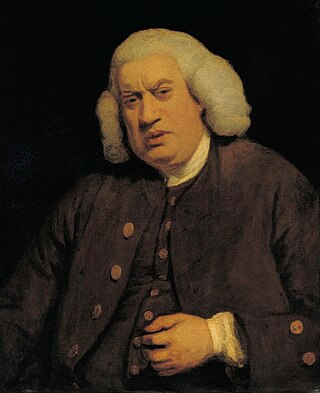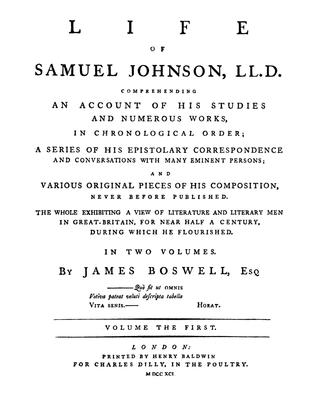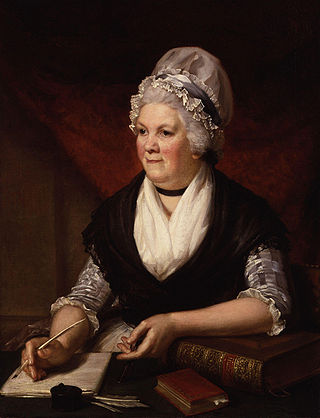Related Research Articles

Samuel Johnson, often called Dr Johnson, was an English writer who made lasting contributions as a poet, playwright, essayist, moralist, literary critic, sermonist, biographer, editor, and lexicographer. The Oxford Dictionary of National Biography calls him "arguably the most distinguished man of letters in English history".

The Life of Samuel Johnson, LL.D. (1791) by James Boswell is a biography of English writer Samuel Johnson. The work was from the beginning a critical and popular success, and represents a landmark in the development of the modern genre of biography. It is notable for its extensive reports of Johnson's conversation. Many have called it the greatest biography written in English, but some modern critics object that the work cannot be considered a proper biography. Boswell's personal acquaintance with his subject began in 1763, when Johnson was 54 years old, and Boswell covered the entirety of Johnson's life by means of additional research. The biography takes many critical liberties with Johnson's life, as Boswell makes various changes to Johnson's quotations and even censors many comments. Nonetheless, the book is valued as both an important source of information on Johnson and his times, as well as an important work of literature.

Soame Jenyns was an English writer and Member of Parliament. He was an early advocate of the ethical consideration of animals.
Egocentric predicament, a term coined by Ralph Barton Perry in an article, is the problem of not being able to view reality outside of our own perceptions. All worldly knowledge takes the form of mental representations that our mind examines in different ways. Direct contact with reality cannot be made outside of our own minds; therefore, we cannot be sure reality even exists. This means that we are each limited to our own perceptual world and views. Solipsism is an extension of this which assumes that only one's own mind is sure to exist.
The Rambler was a periodical by Samuel Johnson.

Sarah Trimmer was an English writer and critic of 18th-century British children's literature, as well as an educational reformer. Her periodical, The Guardian of Education, helped to define the emerging genre by seriously reviewing children's literature for the first time; it also provided the first history of children's literature, establishing a canon of the early landmarks of the genre that scholars still use today. Trimmer's most popular children's book, Fabulous Histories, inspired numerous children's animal stories and remained in print for over a century.

Samuel Johnson's Life of Mr Richard Savage (1744), short title Life of Savage and full title An Account of the Life of Mr Richard Savage, Son of the Earl Rivers, was the first major biography published by Johnson. It was released anonymously in 1744, and detailed the life of Richard Savage, a London poet and friend of Johnson who had died in 1743. The biography contains many details of Savage's account of his own life, including claims that he was the illegitimate child of a noble family that quickly disowned and abandoned him at birth.
Jonathan Swift, as Dean of St. Patrick's Cathedral in Dublin, produced many sermons during his tenure from 1713 to 1745. Although Swift is better known today for his secular writings such as Gulliver's Travels, A Tale of a Tub or the Drapier's Letters, Swift was known in Dublin for his sermons that were delivered every fifth Sunday. Of these sermons, Swift wrote down 35, of which 12 have been preserved. In his sermons Swift attempted to impart traditional Church of Ireland values to his listeners in a plain manner.

London is a poem by Samuel Johnson, produced shortly after he moved to London. Written in 1738, it was his first major published work. The poem in 263 lines imitates Juvenal's Third Satire, expressed by the character of Thales as he decides to leave London for Wales. Johnson imitated Juvenal because of his fondness for the Roman poet and he was following a popular 18th-century trend of Augustan poets headed by Alexander Pope that favoured imitations of classical poets, especially for young poets in their first ventures into published verse.

The Vanity of Human Wishes: The Tenth Satire of Juvenal Imitated is a poem by the English author Samuel Johnson. It was written in late 1748 and published in 1749. It was begun and completed while Johnson was busy writing A Dictionary of the English Language and it was the first published work to include Johnson's name on the title page.

Irene is a Neoclassical tragedy written between 1726 and 1749 by Samuel Johnson. It has the distinction of being the work Johnson considered his greatest failure. Since his death, the critical consensus has been that he was right to think so.
A Biographical Sketch of Dr Samuel Johnson was written by Thomas Tyers for The Gentleman's Magazine's December 1784 issue. The work was written immediately after the death of Samuel Johnson and is the first postmortem biographical work on the author. The first full length biography was written by John Hawkins and titled Life of Samuel Johnson.

The Plays of William Shakespeare was an 18th-century edition of the dramatic works of William Shakespeare, edited by Samuel Johnson and George Steevens. Johnson announced his intention to edit Shakespeare's plays in his Miscellaneous Observations on Macbeth (1745), and a full Proposal for the edition was published in 1756. The edition was finally published in 1765.
The health of Samuel Johnson has been a focus of the biographical and critical analysis of his life. His medical history was well documented by Johnson and his friends, and those writings have allowed later critics and doctors to infer diagnoses of conditions that were unknown in Johnson's day.

Samuel Johnson was an English author born in Lichfield, Staffordshire. He was a sickly infant who early on began to exhibit the tics that would influence how people viewed him in his later years. From childhood he displayed great intelligence and an eagerness for learning, but his early years were dominated by his family's financial strain and his efforts to establish himself as a school teacher.
Samuel Johnson, a British intellectual, wrote dozens of essays that defined his views on the politics of his time.
This article is an overview of Samuel Johnson's literary criticism.
Sir John Dalrymple of Cousland, 4th Baronet FRSE FSA (Scot) was a Scottish advocate, judge, chemist and author, best known for his Memoirs of Great Britain and Ireland from the dissolution of the last parliament of Charles II until the sea battle of La Hogue, first published in 1771. A new edition of 1790 carried on to the capture of the French and Spanish navies at Vigo. The Dalrymples formed a dynasty in the Scottish legal profession. Though he was a central figure in the Scottish Enlightenment and a friend of persons like David Hume and Adam Smith, Dalrymple's writings were little appreciated – he has been seen as an irritating member of the Edinburgh literati.
William Hawkins (1722–1801) was an English clergyman, known as a poet and dramatist.
References
- Bate, Walter Jackson (1977), Samuel Johnson, New York: Harcourt Brace Jovanovich, ISBN 0-15-179260-7 .
- Boswell, James (1791), The Life of Samuel Johnson, LL.D., vol. 2, London: Henry Baldwin, for Charles Dilly.
- Greene, Donald (1989), Samuel Johnson: Updated Edition, Boston: Twayne Publishers, ISBN 0-8057-6962-5 .